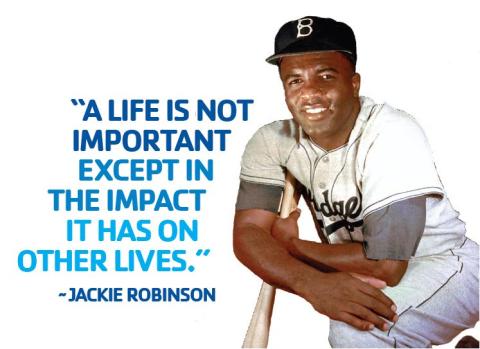Seventy years ago today, April 15, 1947, Jackie Robinson broke baseball's color barrier with the Brooklyn Dodgers.
Jackie Robinson was a baseball player and four-sports star at UCLA – football, basketball, baseball, and NCAA record holder in the broad jump – but if you think of him only as an athlete, you do not understand Jackie or his story.
But as an athlete, the argument can be made that Jackie was America’s greatest; that while he made baseball’s Hall of Fame, there are those who say baseball wasn’t his best sport.
But I will make an additional argument – that Jack Roosevelt Robinson was also the most important African-American in our history.
It was the late Buck O'Neil, chairman of the Negro Leagues Baseball Museum in Kansas City, who helped me understand that before anyone had heard of Martin Luther King Jr., there was Jackie Robinson; before Civil Rights marches in the South, there was Jackie; before Brown v. Board of Education, there was Jackie; before Rosa Parks, there was Jackie; before Thurgood Marshall became a Supreme Court Justice, there was Jackie, and before President Truman desegregated the military, there was Jackie.
The more I heard Mr. O’Neil make these comparisons – and I heard him say it many times to audiences all across America – the more convinced I became that the day when Jackie’s name first appeared in a lineup of the Brooklyn Dodgers, it became a day that changed America – and in my mind established Jackie’s transcendent importance.
In becoming the first black to play in the major leagues, Robinson encountered racism in its vilest manifestations – racial taunts, insults on the playing field and off, character assassination, and death threats, many. But despite the evil of such provocations, he somehow found a way to rise above his tormentors, to literally turn the other cheek, and to conduct himself in ways consistent with the remarkable, transforming individual he was.
Through his talents as an athlete on the field and his off-the-field exemplary personal qualities, Jackie became an enduring symbol to black men and women everywhere; creating optimism, raising expectations, and instilling faith that maybe, just maybe, the declaration that all men are created equal and are endowed by their creator with certain inalienable rights, might become something greater than just words on a document.
Eloquent words, yes; lovely words, yes; ennobling words, yes; but absent their everyday reality in the lives of black Americans they would remain that, words – and nothing more.
There is no small irony in the fact that when the Boston Red Sox -- under its new ownership of John Henry, Tom Werner, and Larry Lucchino, with Dr. Charles Steinberg, Senator John Kerry, Congressman Richie Neal, and me -- initiated the drive to get the Congressional Gold Medal for Jackie, that our efforts began at Fenway Park, a place where Jackie in ’45 had a bogus tryout and where for too many years too many black people never felt welcome.
The culmination of that effort, the presentation of the Gold Medal by President George W. Bush to Mrs. Rachel Robinson, Jackie’s widow, before members of Congress and a standing room only audience in a grand ceremony in the Rotunda of the United States Capitol in March of 2005, was a special day for the Robinson family and for the game of baseball, but rising above all, it was a special day for America.
Today, at Dodger Stadium in Los Angeles, another special ceremony will take place. The Dodgers will unveil a statue of Jackie just outside the stadium’s main entrance; they will do this with the Robinson family present – beautiful and elegant Rachel, children’s author and daughter Sharon, and son David, a coffee grower in Tanzania.
It took the Dodgers a while to figure this out, as in 48 years past Jackie’s retirement, why a statue of Jackie was appropriate, but they did – good for them.
And, as the Dodgers take the field today, every member of the team will wear number 42, Jackie’s number; but not just at Dodger Stadium will his number be worn, but by every player who plays America’s Game – wherever it is played this day.
Finally, I submit, to understand American history one must know George Washington, but to understand it in its broadest context, one must also know Jackie Robinson.
One was our first president; the other our first African-American to play Major League Baseball, but as recipients of the Congressional Gold Medal, both stand forever equal and now forever bound.
